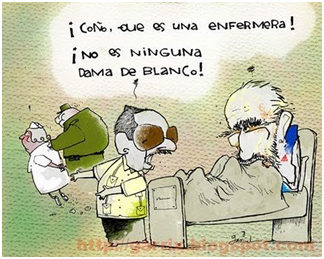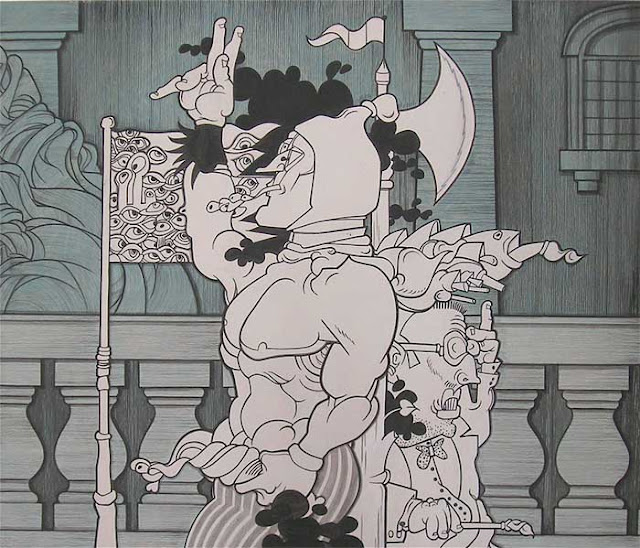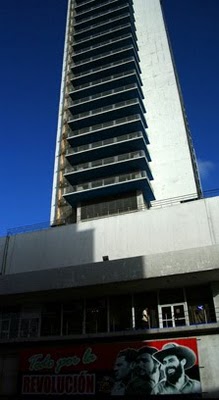From the moment you push the door open, you notice something is not right. By now you should be feeling a change in the atmosphere, the change of temperature to give your skin, so mistreated by the sun, a breather. You should feel the air conditioner running at a place where you pay with the coin of higher value in your country.
Nevertheless, inside awaits a heat as intense as the one outside. Maybe hotter.
The salesclerk, a skinny mulatto, is wearing his button-down shirt as required by the rules. At his armpits, the blue color from the shirt gets darker: the sweat runs all the way down his ribs, it forces him to pull the shirt away from his body over and over again during his shift.
You ask him for a soda, and you lay the convertible peso that equals two days of work on the counter. You know you can’t allow yourself to spend that type of money frequently, but the climate is maddening and at moments you feel forced.
When you reach for the can, you think there has been a mistake:
– It’s not cold, my friend, can you change it for me?
His answer, a little indifferent, is the answer of someone who has had to repeat it on countless occasions:
– They’re all like that. The rules about saving force us to set the fridge at the highest temperature, that is why they can’t get as cold as they should.
You’re still holding the can in your hand. You know that it is not what your lips are waiting for to mitigate your thirst. You know you’ll regret having spent two days worth of your salary for a drink you won’t enjoy. But you sense the same thing will happen in every store you go to.
Just out of curiosity you ask him:
– Is it the same everywhere? I mean, is it an orientation given to all the units?
– Not only to the units that sell in convertible pesos –he assures me – but to all the places with a refrigeration system, whatever they are. Here, for example, out of the twelve hours that we work, we can only use the air conditioning for four, and the fridges should be on the highest temperatures.
You look around: you don’t see even a window. There isn’t a single hole from where a light breeze can come in to alleviate the drowsiness. You think of your office, which never had air conditioning, but at least had a window as consolation from where you could look out and, from time to time, cool your forehead.
You thank him, keep the can and rush out of that café so similar to a crematory. You finish the soda with no desire, almost out of obligation to the money spent.
You walk the streets with not much to do, but now you start noticing all of your surroundings. A Banco Popular, for example. Designed like a concrete fort for obvious reasons, with hardly any windows for natural ventilation. Inside, the consoles are covered with spider webs. You don’t know this because you don’t get to ask, but they also prohibit the use of air conditioning here, for good.
Hundreds of people wait for their turn to be called. Hundreds of workers spend their eight or ten hours in there, receiving and giving out money. The heat multiplies itself due to the agglomeration of so many bodies.
You push another door open: another store for convertible pesos only. This time you are not surprised by the suffocating atmosphere, but a nauseating smell of concentrated air fresheners, along with the humidity from all the sweat in general, makes you leave immediately in search of oxygen.
You remember when, a few years back, the national authorities announced that the energy crisis in Cuba had come to an end. They mobilized the entire country; they got the streets in party mode.
They took away the improvised fans from everybody, their fridges, their TV’s. Under the “change” euphemism, they sold them brand new equipment, imported from China. They sold them electric burners and rice makers. It is true that beforehand they had raised electricity rates noticeably, however, it seemed like we were moving forward. You remember feeling a vague illusion of prosperity.
A name was dedicated to the year the initiative started. 2006 was called “The Year of the Energy Revolution.”
And every Cuban, you included, thought the era of endless power outages, implacable savings, as part of the past. A past to which seemed, we were never going back.
Today, every spot is gripped by savings. Offices crowded by computers and equipment in need of air conditioning. Cafeterias with perishable products. Workplaces where it is an inhumane practice if working hours are not reduced.
So, what happened this time? What failed once again?
You know you won’t have the answers to these questions. If you asked somebody, you would hear all sorts of justifications – the criminal imperialist blockade, the world crisis, the adjustments in our economy – that you could recite to yourself beforehand.
That is why you’ll get home very soon, to your own heat bubble and exhaustion. You, just like many others, have lost all hope for progress.
You know that tomorrow, maybe the energy subject will be stirred up any unthinkable way, but then, the tires will stop and this country’s busses will be paralyzed, or salt will vanish from all the markets and you will be forced to cook while adapting the taste buds to the emergency.
Too many years in training to be that naïve.
As you come back to listening to your own steps you notice that the soda you paid for didn’t take your thirst away. You also notice you weren’t able to find any other insignificant things you were looking for in the stores. And that you’ll get home with your skin a little more scorched from the sun.
The only thing you ask for is, for nobody, absolutely nobody to cross your path with an offensive phrase, any type of rudeness, a subject of discussion. Not even your family or friends.
You don’t know this, you think that the discouragement you have inside is not important. But at this very moment you believe you are sick from a tropical cancer, a loaded gun in search of a reason to pull the trigger.
Translator: Angelica Betancourt
August 19, 2010


 Minister of Finances and Prices
Minister of Finances and Prices Fidel Castro in Parliament, for the first time in four years
Fidel Castro in Parliament, for the first time in four years



